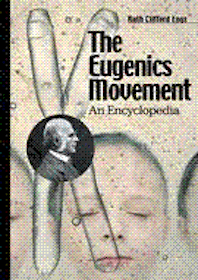Ruth Clifford Engs, Author. The Eugenics Movement: An Encyclopedia. Greenwood Publishing Group [ABC-CLIO]: Westport Ct, 2005.
Eugenics―the theory that we can improve future generations of humans through selective breeding―was one of the most controversial movements of the early 20th century. Often tied to racist beliefs and nativist desires to limit immigration, the eugenics movement attracted some of the most prominent scientists and social reformers of the day. This encyclopedia brings into one place concise descriptions of the leading figures, organizations, events, legislation, publications, concepts, and terms of this vitally important period historical movement. Although focused on the United States during the heyday of the movement, the encyclopedia includes material on international event as well as connections to important contemporary issues such as genetic engineering, family balancing, and the possibility of human cloning.
The reference covers almost 200 years of history and includes over 250 entries on such topics as:
- Inherited conditions such as alcoholism, prostitution, poverty, and criminality that eugenicists thought could be eliminated by following eugenic methods.
- Concepts such as feeblemindedness, race degeneracy, and race suicide that were pervasive during the era of the eugenics movement.
- Tools that eugenicists relied on, such as laws that allowed forced sterilizations of the unfit in the United States, Nazi Germany, and other countries.
Organizations that encouraged the fit to produce more children.
The continued acceptance of attempts to improve future generations through genetic testing and treatment.


